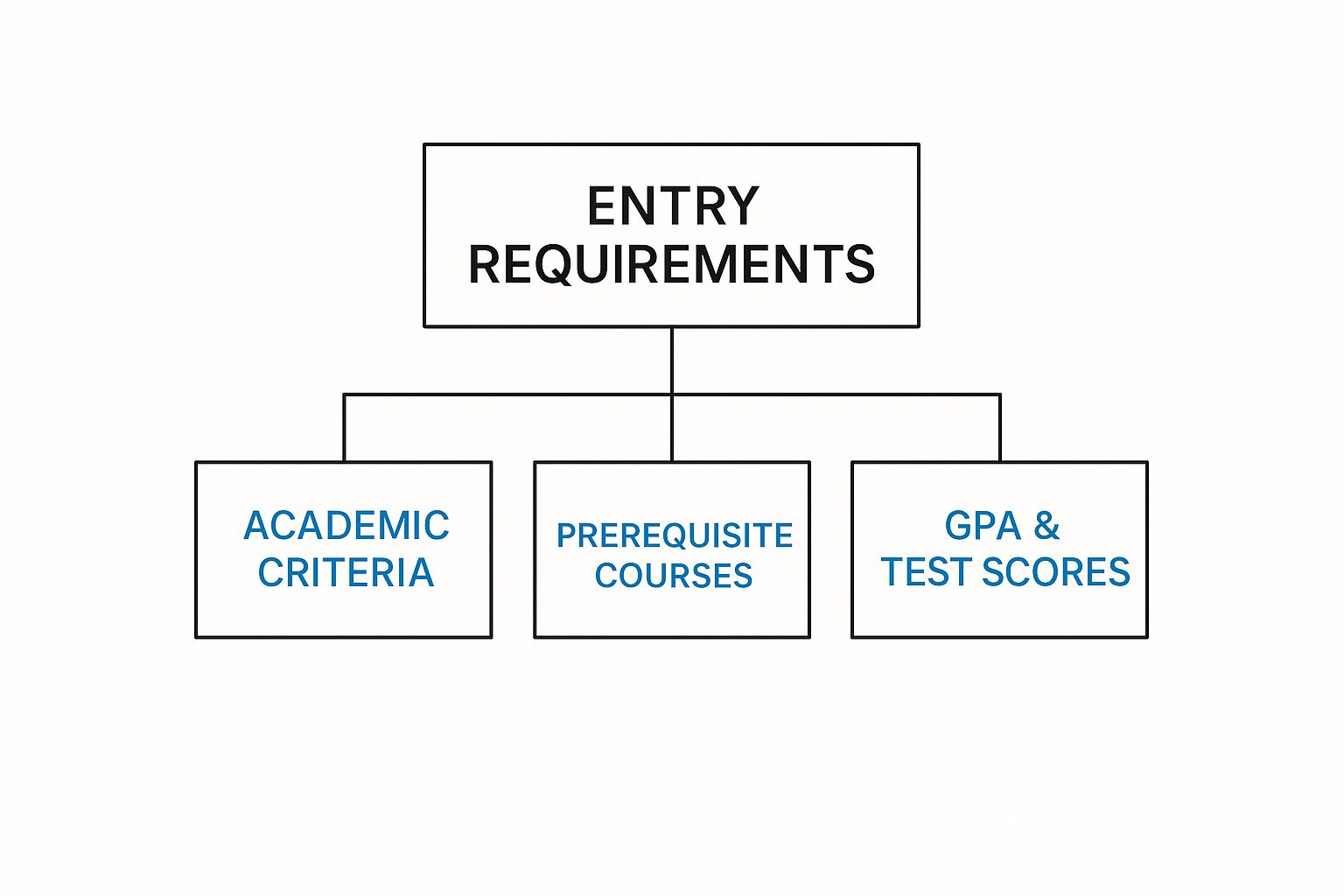So, you’re thinking about becoming a nurse? Fantastic choice. But before you can get onto a ward, you first need to get a spot on a university course, and that means meeting a specific set of requirements.
Let's break down exactly what universities are looking for. It’s a mix of academic grades and personal qualities, all designed to make sure you're ready for one of the most trusted professions out there.
What Are the Core Nursing Degree Entry Requirements?
Getting into a nursing programme can feel a bit daunting, but it all boils down to a clear set of standards set by both the universities and professional bodies like the Nursing and Midwifery Council (NMC). Think of these requirements as the foundation of your nursing career. Each piece is there to ensure you have the skills, knowledge, and integrity needed for a demanding role where patient safety is everything.
This infographic gives you a quick overview of what you'll need to cover.

As you can see, it all starts with proving you're academically ready. But that's only half the story.
Balancing Academic and Personal Standards
The whole application process is designed to check two things: first, that you can handle the intellectual challenge of a degree, and second, that you have the personal qualities essential for providing compassionate care. Universities need to see you can grasp complex scientific concepts while also showing real empathy, resilience, and integrity.
To give you a clearer picture, here’s a quick rundown of the typical requirements you’ll come across when applying for a nursing degree in the UK.
Typical UK Nursing Degree Entry Requirements at a Glance
| Requirement Category | Typical Standard | Notes |
|---|---|---|
| GCSEs | 5 GCSEs at grade 4/C or above. | Must include English, Maths, and a Science. |
| Level 3 Qualifications | A-levels (CCC to BBC) or equivalent. | BTEC Diplomas and Access to HE Diplomas are common alternatives. |
| UCAS Points | 96 to 128 UCAS Tariff points. | Varies significantly between universities. Always check their specific requirements. |
| Personal Statement | A compelling essay showcasing your motivation. | This is your chance to show your passion for nursing and any relevant experience. |
| Interview | A successful interview performance. | Expect questions about your skills, values, and understanding of the profession. |
| DBS Check | An enhanced Disclosure and Barring Service check. | This screens for any criminal records to ensure patient safety. |
| Health Check | An occupational health assessment. | Confirms you are physically and mentally fit to meet the demands of the role. |
These requirements ensure every applicant is ready for the rigours and responsibilities of nursing.
The academic side of things usually starts with your GCSEs. Most universities will ask for at least five GCSEs at grade 4/C or above, specifically including English, Maths, and a science subject. On top of that, you’ll need Level 3 qualifications, like A-levels (typically ranging from CCC to BBC) or a BTEC Diploma.
If you don't have traditional A-levels, don't panic! Many people take an alternative route. You can explore our guide on what an Access to Higher Education course involves to see how this pathway could work for you.
A strong application successfully combines academic achievement with a genuine, demonstrable commitment to caring for others. It’s this balance that admissions tutors are looking for.
Beyond your grades, you'll also need to pass a few non-academic checks. These include an enhanced Disclosure and Barring Service (DBS) check, which is a background check for any criminal records, and an occupational health assessment.
These aren't just boxes to tick. They are vital safeguards that help maintain the incredibly high standards of the nursing profession, which is made up of over 748,000 registered nurses in the UK.
Building Your Academic Foundation for Nursing School
Your academic record is the first thing universities will look at, and it's your chance to make a great first impression. Think of it as the blueprint for your nursing career; it shows admissions tutors you have the knowledge and resilience to handle a demanding degree and, eventually, the immense responsibility of patient care.
These qualifications aren't just arbitrary hurdles to jump. They’ve been carefully chosen to make sure you have the core skills needed to hit the ground running from day one. In short, solid grades are a non-negotiable part of the overall nursing degree entry requirements.

Core GCSEs: The Non-Negotiable Starting Point
Before you even think about A-levels or other qualifications, universities will check your GCSEs. Just about every nursing programme in the UK will want to see passes at grade 4/C or above in a handful of key subjects.
These are considered essential because they prove you have the basic literacy and numeracy skills vital for safe and effective nursing. Without them, you'd struggle.
- English Language: Absolutely crucial for clear communication with patients and colleagues, writing accurate notes, and getting your head around complex medical documents.
- Mathematics: You'll use this every single day for things like calculating drug dosages, monitoring a patient's fluid intake and output, and correctly reading data charts. There’s no room for error.
- Science (often Biology): This gives you that foundational understanding of how the human body works, which is the bedrock of everything you'll learn about patient conditions and treatments.
Moving to Level 3 Qualifications
Once your GCSEs are sorted, the next step is to show you can handle studying at a higher level. This is where Level 3 qualifications like A-levels, BTECs, or an Access to HE Diploma come into play.
Universities use these to see if you have what it takes to succeed on a degree course. A typical A-level offer for nursing is usually somewhere between CCC and BBC, though it really depends on the university. While they might be flexible on some subjects, choosing wisely can give you a real advantage.
Choosing a relevant subject like Biology or Psychology at A-level isn't just about ticking a box. It’s about giving yourself a head start. You'll walk into your first lecture already familiar with key ideas, which makes that jump to university-level study feel a lot less daunting.
For mature students or anyone who didn't take the traditional A-level route, the Access to Higher Education Diploma is a brilliant and widely accepted alternative. These courses are specifically built to get you ready for university, filling in any knowledge gaps and building your academic confidence. If this sounds like it could be for you, it's worth learning more about how Access courses can help you prepare for university.
Ultimately, all these different qualifications get translated into a language that every university understands: UCAS Tariff points. Think of it as a universal currency. It allows admissions teams to fairly compare someone with A-levels to someone with a BTEC or an Access to HE Diploma, levelling the playing field for everyone.
Clearing the Essential Non-Academic Hurdles
Getting top grades is a huge achievement, but it's only half the story when it comes to a nursing degree. Universities aren't just looking for academic stars; they need to see that you have the character, resilience, and integrity for a profession built entirely on trust.
Think of these non-academic hurdles as just as crucial as your A-levels or BTEC results. They are designed to assess your suitability for the role and to safeguard the public, ensuring you're ready to practise before you even step onto a ward.

Proving Your Character and Fitness to Practise
First up, you'll face a Disclosure and Barring Service (DBS) check. Because nurses work closely with vulnerable children and adults, you’ll need an enhanced check that reveals your full criminal record, including any spent convictions or cautions. Don't panic if you have a past mistake—it doesn't automatically rule you out, but being completely honest is absolutely essential.
You will also have an occupational health screening. Nursing is a demanding job, both physically and emotionally. This assessment simply makes sure you're medically fit to handle the demands of the course and clinical placements, without putting yourself or your future patients at risk.
Think of these checks as the professional equivalent of a pilot's pre-flight inspection. They are routine, necessary procedures that ensure everyone's safety before the journey begins. Each one confirms you are ready for the responsibility ahead.
Crafting a Compelling Personal Statement
Your personal statement is arguably the most important non-academic piece of your application. It’s your one real chance to speak directly to the admissions tutors and show them who you are beyond your grades. This is where you connect your life experiences to the core values that define nursing.
A brilliant personal statement tells a story. It should weave together your motivations, your experiences, and your understanding of what being a nurse truly means.
- Show Your Motivation: Why nursing? Was there a specific moment that sparked this passion? Dig deeper than simply saying you "want to help people"—explain what that actually means to you on a personal level.
- Demonstrate Relevant Experience: Reflect on any work experience or volunteering you've done. What did you learn from your time in a care home, helping out at a charity shop, or even in a customer service role? Focus on transferable skills like communication, empathy, and teamwork.
- Connect to the 6 Cs: Show the university you understand the professional values that underpin modern nursing. Try to frame your experiences around the 6 Cs of Nursing: Care, Compassion, Competence, Communication, Courage, and Commitment. Give them concrete examples of how you’ve demonstrated these qualities.
This statement is your platform to prove you have both the heart and the head for nursing. It’s the bridge between your academic achievements and your personal suitability, making it an incredibly powerful part of your application.
Exploring Alternative Pathways into Nursing
The traditional A-level route into nursing is well-trodden, but it’s far from the only path. For many aspiring nurses—especially if you're a mature student or looking for a career change—alternative qualifications are a much more flexible and practical way to meet the nursing degree entry requirements. These pathways recognise that valuable life experience and determination are just as important as traditional exam results.

If you don't have the A-levels a university is asking for, don't worry. These routes are specifically designed to bridge that gap. They provide a respected and accessible way to get you ready for higher education and onto a university nursing course.
The Access to Higher Education Diploma
Perhaps the most popular alternative is the Access to Higher Education Diploma. Think of it as a focused, one-year university preparation course that’s equivalent to three A-levels. It's built from the ground up for adults returning to education, equipping them with the academic skills and subject-specific knowledge they need to succeed.
Universities really value these diplomas. For anyone wanting to get into nursing, a diploma in a relevant field like Health and Social Care or Nursing is perfect. Completing an Access to Nursing diploma is a powerful way to show your commitment and prove you're ready for university-level study.
Nursing Degree Apprenticeships
If you're the kind of person who learns best by doing, the Nursing Degree Apprenticeship is an excellent 'earn while you learn' model. This route brilliantly combines part-time university study with paid, on-the-job clinical training in a healthcare setting like an NHS trust.
This pathway has some fantastic benefits:
- No Tuition Fees: Your course fees are usually covered by your employer.
- Earn a Salary: You’re employed and get paid a salary throughout your training.
- Immediate Experience: You get to apply what you learn in lectures to a real-world clinical environment from day one.
Apprenticeships are a fantastic way to gain a full nursing degree while building up years of practical experience, making you incredibly employable when you qualify.
"Alternative pathways are not 'easier' options; they are different ones. They provide structured, rigorous routes for passionate individuals who might otherwise be locked out of the profession, enriching the future nursing workforce with diverse experiences."
Foundation Years and Their Role
Another brilliant option is a Foundation Year. Some universities offer nursing degrees with an integrated foundation year, which essentially makes it a four-year course. This initial year is all about building your core academic skills and scientific knowledge, making sure you're completely prepared for the demands of the main degree programme.
The demand for nurses always ebbs and flows. After a huge surge in interest during the pandemic, which saw accepted places rise to 23,490 in 2021, the numbers later dipped. However, a recent 1% overall increase in acceptances shows that recruitment efforts are very much ongoing to meet the healthcare system's needs, as you can see from recent reports on student nursing numbers. This makes these alternative pathways more important than ever.
Why These Entry Requirements Matter for Patient Care
Have you ever looked at the list of requirements for a nursing degree and wondered why they’re so specific? It can feel like a long series of academic and personal hoops to jump through. But these aren’t just arbitrary rules; they form the very first line of defence in protecting patients and upholding the standards of a profession built on trust.
Think of it like building a house. The nursing degree entry requirements are the foundation. Without a solid base of academic know-how and personal integrity, the whole structure of a nurse's career—and more importantly, the safety of their patients—is at risk. Each requirement is there for a reason, testing a skill or quality that's absolutely essential in modern healthcare.
Translating Academics into Clinical Skills
The focus on strong GCSEs and A-levels isn't just about proving you can pass an exam. It’s about making sure you have the fundamental tools to practise safely and effectively from the moment you start your training. In reality, each subject translates directly into a critical, on-the-job skill.
- Numeracy for Medication Safety: Strong maths skills are completely non-negotiable. Nurses are constantly calculating precise medication dosages, monitoring IV drip rates, and interpreting patient charts. A simple slip-up in the maths can have devastating consequences.
- Literacy for Clear Communication: Excellent English skills are vital. You’ll be writing accurate, clear patient notes, getting your head around complex medical documents, and, most importantly, communicating with empathy to patients and their families, often when they're at their most distressed.
- Science for Clinical Understanding: A background in science, especially biology, gives you the essential knowledge of human anatomy and physiology. This is the bedrock for understanding diseases, treatments, and how patients respond to care.
Assessing the Unteachable Qualities
While academic skills can be taught and refined, qualities like compassion, resilience, and integrity are much harder to measure. This is where your personal statement and interviews come into play. They’re designed to get a sense of your character and the core values that make a truly exceptional nurse.
The entry process is a filter designed to find individuals who not only have the academic capability but also the innate compassion and strength of character to handle the emotional and ethical demands of caring for people at their most vulnerable.
This careful selection process is more critical now than ever. The NHS long-term workforce plan estimates a need for around 13,100 new nurses every year through to 2036/37 to tackle a major forecasted shortage.
With 7.5% of nursing posts currently unfilled, getting the right people through the door is a delicate balancing act. It's about ensuring these entry routes produce competent, compassionate professionals who are ready to help solve the UK’s nursing shortfall. You can read more about the challenges in UK nursing recruitment on Nursing in Practice.
Any Questions? Your Nursing FAQs Answered
The journey to becoming a nurse is full of exciting milestones, but let's be honest, it can also be packed with questions. Navigating the world of UCAS points, personal statements, and DBS checks can feel a bit overwhelming at first.
But don't worry, you're not alone. We've gathered some of the most common questions we hear about nursing degree entry requirements to give you the clear, straightforward answers you're looking for.
Can I Become a Nurse Without a Science A-Level?
Yes, you absolutely can, though it might narrow down your university options a little. While plenty of institutions love to see at least one science A-level like Biology on an application, many others are much more flexible. They get that a passion for care comes from all sorts of backgrounds.
A brilliant and widely accepted alternative is an Access to HE Diploma in a health or science-related subject. On top of that, some universities will look favourably on applicants with strong GCSE science grades alongside A-levels in related subjects like Psychology or Health and Social Care.
The golden rule? Always check the specific entry requirements for each university you’ve got your eye on. If you're missing a formal science qualification, getting some hands-on healthcare experience is a fantastic way to show your commitment and prove you understand the field.
Think of relevant work experience as a practical demonstration of your scientific curiosity. It shows you've actively engaged with the principles of care and the human body, even if it wasn't through a traditional A-level route.
How Important Is Work Experience for My Application?
It’s incredibly important, but not in the way most people think. There’s a huge misconception that you need experience in a hospital ward. What universities really want to see is proof that you grasp the realities of a caring role and have started developing those essential core skills.
This experience can come from all sorts of places. Volunteering in a care home, supporting people with disabilities, working for a health charity, or even a customer service job that demanded real empathy and communication—it's all valuable.
The key isn't what you did, but what you learned. When you write your personal statement, don't just list your duties. Talk about what the experience taught you about compassion, teamwork, and resilience. Showing you understand the 6 Cs of nursing (Care, Compassion, Competence, Communication, Courage, and Commitment) through your own stories will make your application shine.
What Happens If There’s an Issue with My DBS or Health Check?
These checks are a non-negotiable part of the nursing degree entry requirements, and a flag on either can affect your offer. If the DBS check brings up a past criminal record, it doesn’t automatically mean you’ll be disqualified. Universities look at any cautions or convictions on a case-by-case basis, considering what happened and how long ago it was. The most important thing is to be completely honest from the start.
The occupational health check is there to make sure you can handle the physical and emotional demands of the course without putting yourself or patients at risk. If a health condition is flagged, the university's health team will see if they can make 'reasonable adjustments' to support you. However, if they feel you can't safely complete the clinical side of the course, your offer may be withdrawn.
What Are the Entry Requirements for Mature Students?
Universities love mature students! They bring so much life experience, maturity, and genuine motivation to the course. The most common and respected way in is by completing an Access to Higher Education Diploma in Nursing or a related health subject. It's specifically designed for adults and is the equivalent of three A-levels.
Don't have the right GCSEs in Maths and English? Don't panic. You can often take GCSE equivalency tests or get a Functional Skills Level 2 qualification instead, which most universities accept. Your personal statement is your secret weapon here—use it to show how your life and previous work have perfectly prepared you for the rewards and challenges of nursing.
Ready to take the next step towards your nursing career, even without traditional A-levels? Access Courses Online provides accredited Access to HE Diplomas that are your direct pathway to university. Discover how our flexible, online courses can fit around your life and get you started on your journey. Learn more about our Access to Nursing courses.

